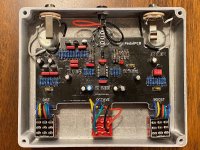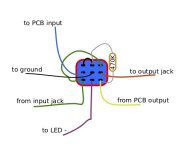Alright, so, after researching this a bit and trying a few things out, here's what I've found...
Quick fixes don't work primarily because the issue isn't what I thought it was. Typically, if you're getting a pop on the first click but not subsequent clicks then it usually points to a capacitor issue...but I don't think that's what's going on here. Simply changing out capacitors isn't likely to eliminate the pop. Fact that it's doing this on other pedals as well as the Parentheses means it's not a simple issue. This is a very common issue and isn't easily fixed within the pedal itself, regardless of whether it has a buffer, certain capacitors, and whatnot.
Here's what's weird...I tested a bunch of different pedals I own including some commercial ones. All of them exhibited an audible pop when engaging: an MXR distortion pedal, EHX Glove, even a Boss JB-2 (which is known to have a really good buffer)...all of them have audible pops. The Boss JB-2 even exhibited a bit of microphonics. When engaged, tapping on the pedal could be heard with reverb on. Weird!
The one that didn't pop was an EQD Astral Destiny. The reason is that it uses an electronic bypass relay switch rather than a mechanical switch.
So, yeah, turns out pretty much any pedal with a mechanical switch is subject to this issue. However....there are ways to minimize the pop.
I use a TC Electronic Sentry for my noise gate and run all my drives through it. When it's engaged and set properly for the drives attached none of the same pedals exhibit a pop. So, on top of tamping down noise, seems it also does an excellent job in keeping pops from being heard when pedals are engaged. That works when things are silent so you might still hear a pop while still playing. Not much can be done about that so you might need to engage at the right time to minimize any pop.
So, yeah, I think the easy answer is: for pedals that have a noticeable pop, good caps, and proper pulldown resistors, adding a noise gate into the mix can help tamp down on the remaining pop issue. TC Electronic Sentry is my pick mainly cause it has a Send and Return loop to help further reduce noise based on what's coming in the Input. Mileage may vary but, honestly, I think this is the best answer in this case.
I did order some better switches to see if that helps in minimizing the pop. My guess is that a softer switch will minimize any microphonic issues with the click of the switch itself introducing a pop in the signal. Gonna do that as an experiment and go from there.




